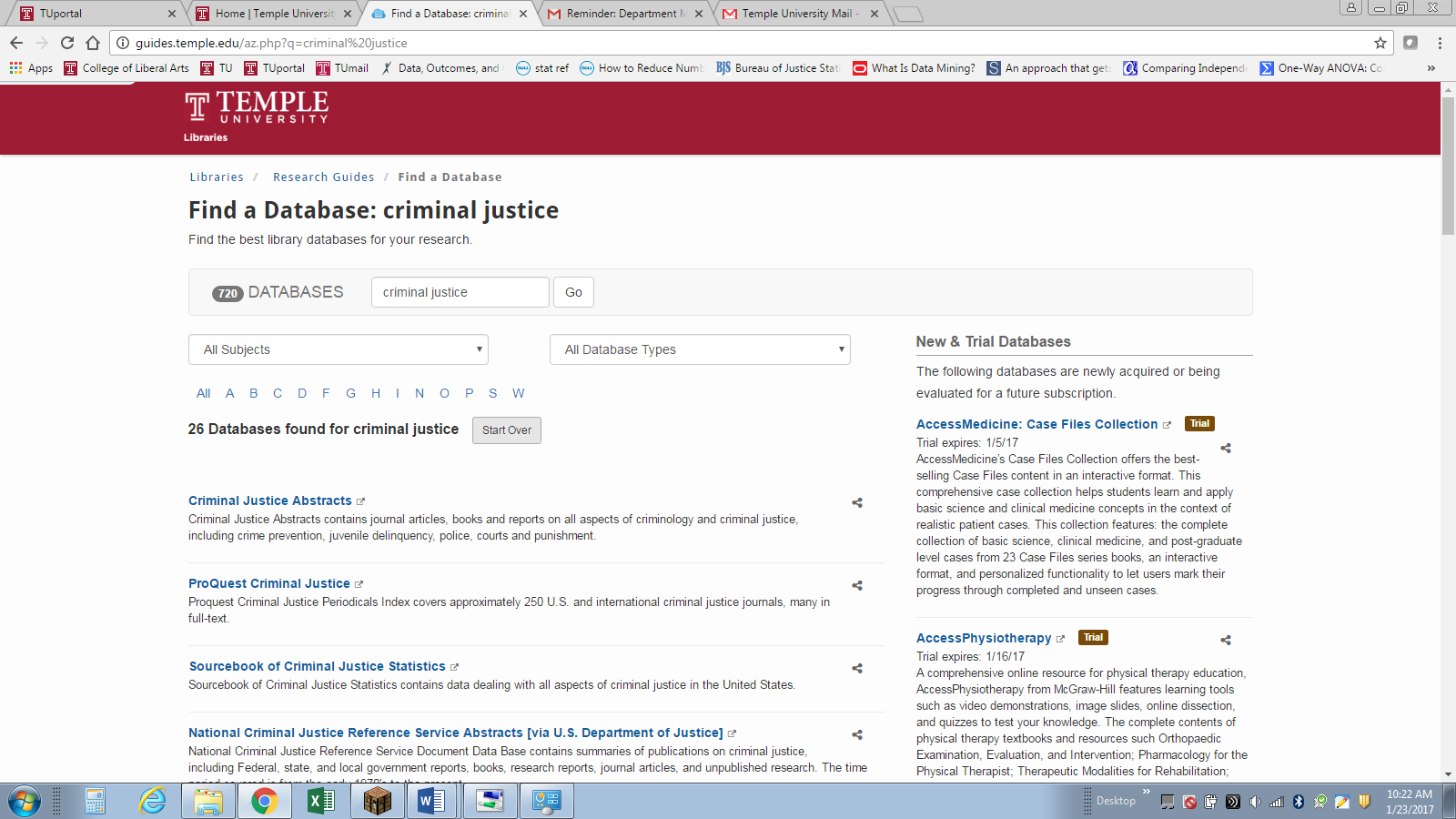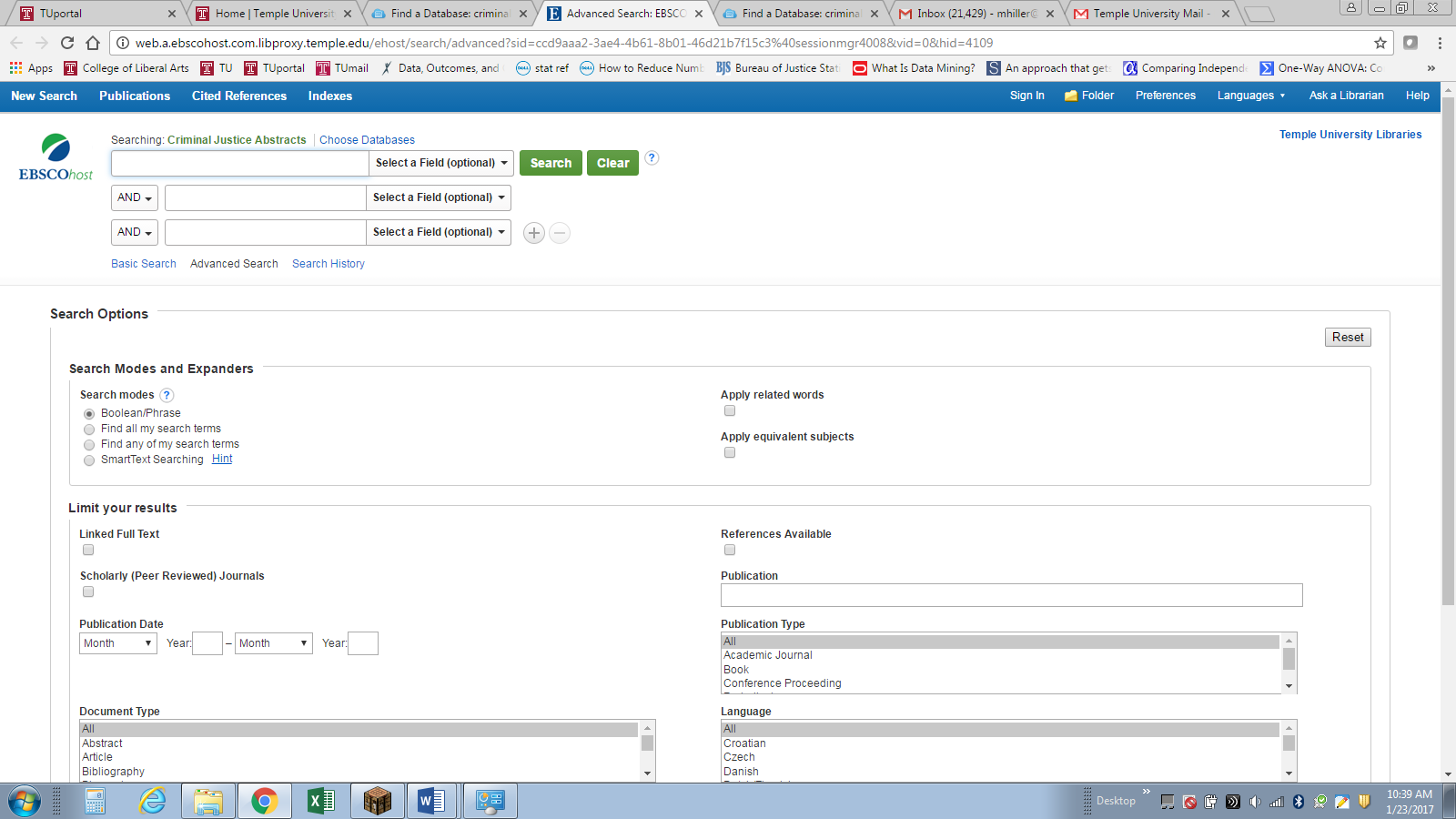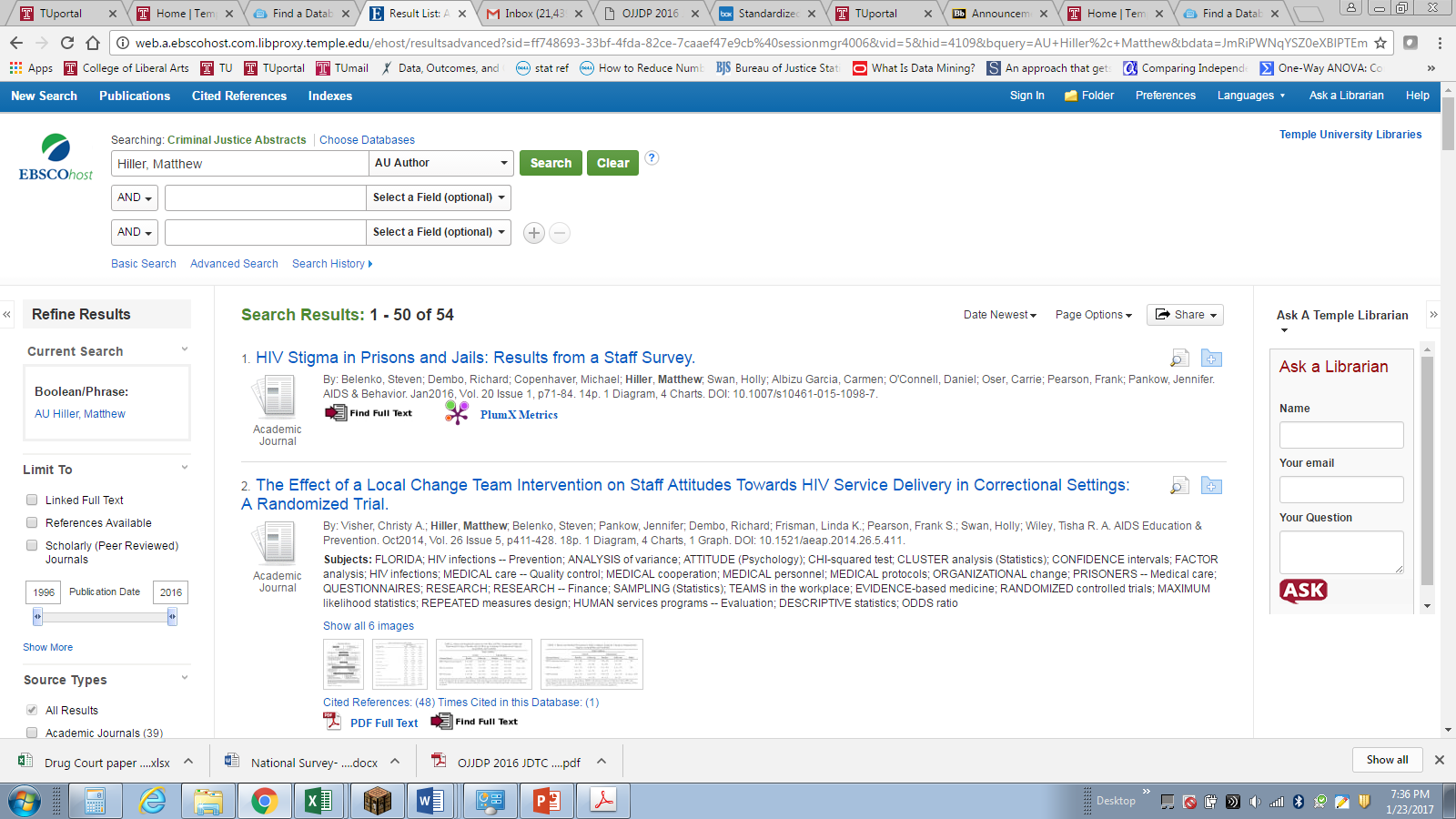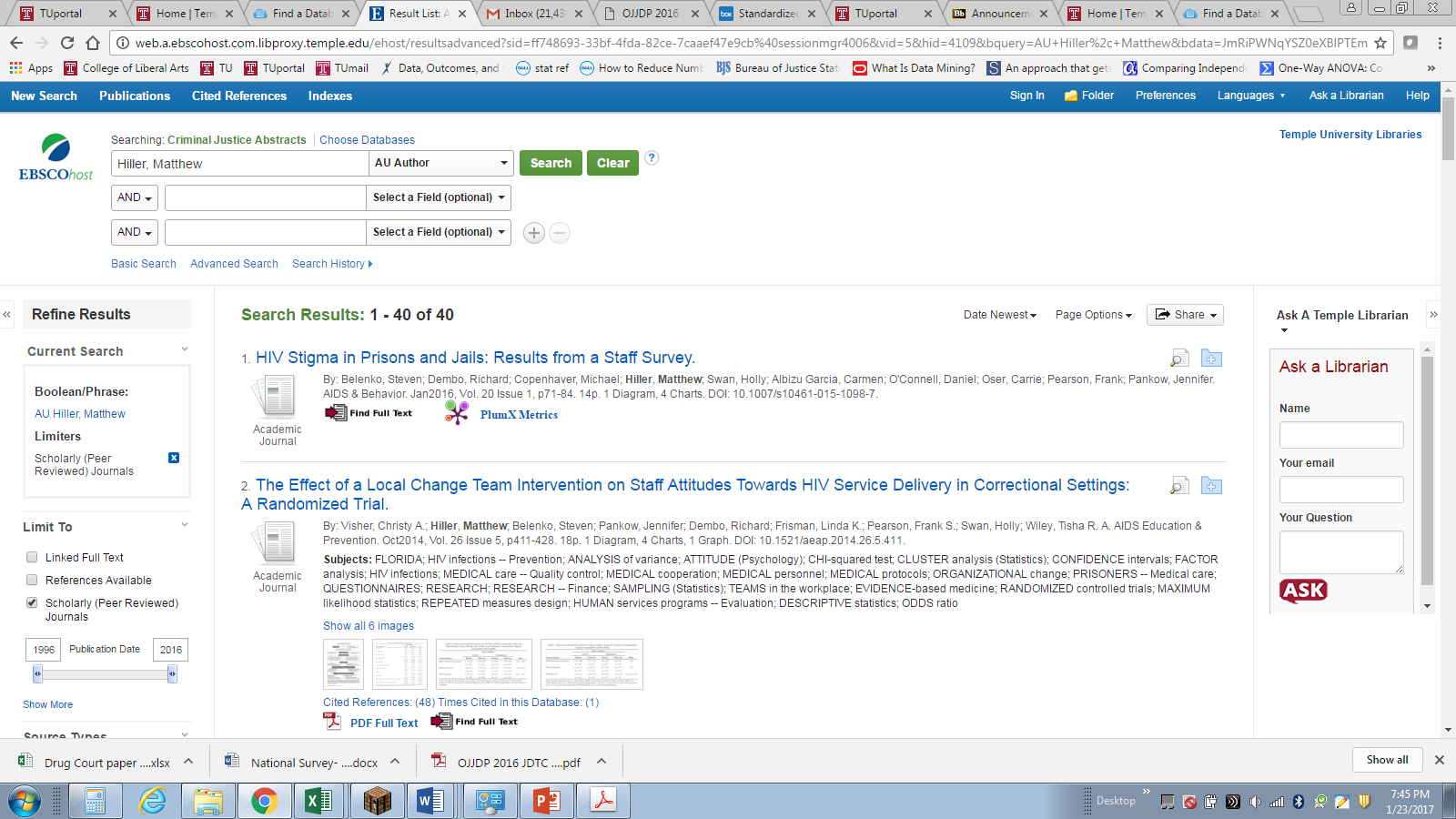Attached below.
Lab Searching for Scientific Articles
Searching for Scientific Journal Research Articles
What is a scientific journal research article?
A scientific journal article is a paper that has been subjected to an intensive quality assurance process known as peer review.
What is peer review?
When criminal justice researchers want to publish the findings of their studies as a scientific journal article, they submit their research paper to a specific scientific journal. The editor of that journal (e.g., Criminology, Criminology and Public Policy, Criminal Justice and Behavior, Journal of Experimental Criminology) picks 3-5 respected scientists who have expertise in the topics covered in the study and/or have expertise in the methodologies used in the study. Each of these individuals conducts a blinded review (the authors name is stripped from the paper) to maintain anonymity and reviewer objectiveness. Each reviewer conducts a critical review of the paper, identifying any flaws that affect the scientific validity of the paper. Basically, the reviewers rip the paper apart and write detailed comments for the editor to consider and to send to the author. Using these comments and their own review of the paper, the editor then decides whether to reject the paper, ask the author(s) to revise and resubmit, or accept for publication. If author(s) are asked to revise and re-submit the paper; and if they do so and adequately address all of the reviewers’ comments, thus improving the validity of the study, they likely will have their paper accepted for publication. Once in print, it is now a full-fledged scientific journal article. It isn’t science until it has passed peer review.
Where do you find scientific journal articles?
The best resources for finding scientific articles are two databases available through Paley Library: (1) Criminal Justice Abstracts or (2) ProQuest for Criminal Justice. The contents of these databases largely overlap each other, so search one or the other. Personally, I prefer Criminal Justice Abstracts. You may be using Google or a more focused version of it, Google Scholar, to find information. The advantage to using Criminal Justice Abstracts and/or ProQuest for Criminal Justice is that the fake stuff has already been filtered out so what you find in these databases is legit.
How do I search for scientific journal articles? (Searching for a scientific article using a key word or term)
The next page will present the process you will need to follow in order to find scientific journal articles. Each step will include a thumbnail of the web page (edited to reduce the size of the image and to emphasize specific elements). Once you work through this process two or three times, you will be a pro at this!
| Step-by-Step Instructions for Searching for Scientific Articles | |
| Web Page Thumbnail | Comments |
|
|
|
|
|
|
|
|
|
| Web Page Thumbnail | Comments |
|
|
|
|
|
|
|
|
|
Assignment/Exercise
The quality of the literature search directly impacts the quality of the research paper’s literature review. The following exercise will help you apply what you just practiced in the first three pages of the lab and to begin the research process needed for the research paper in this class. You will upload this lab when you are done through the course CANVAS page. Select Fear of crime is the focus of search for this exercise.
Exercise 1. In both Criminal Justice Abstracts and ProQuest for Criminal Justice type “fear of crime” in the key word search. Use the quotation marks to ensure you have searched for this as an entire phrase.
| Record you answers to the following questions, immediately below each question to which the answer corresponds. First answer every question using Criminal Justice Abstracts, then answer every question using ProQuest for Criminal Justice. Please record your answers in blue italicized font. 1. How many records did the search find when you used “fear of crime” as a term?
2. How many records remained after you limited the search to scholarly article?
3. How many records remained after you limited the search to articles published between
4. Select one study from the search above, and write the authors’ full names in the order
5. What year was it published? Do different articles for each database.
6. Where (in what journal) was the study published? Do different articles for each database.
7. What is the page range for the article (first page number - last page number)? Do different articles for each database.
8. Is it available in full-text? Do different articles for each database.
9. Is it available for download? Do different articles for each database.
|
Now familiar with the two databases, the next step in the process of searching the scientific literature is to begin learning about your topic. Key to this is reading about the topic, but as you noticed, there are a whole lot of scientific articles on Fear of Crime. How do you narrow your focus to something that really captures your interest?
Usually, if you are completely new to a topic like most of you are to fear of crime, to start the learning curve, you need to read the information you found in either your Criminal Justice Abstracts or ProQuest for Criminal Justice search. Remember, you want only scholarly, peer-reviewed articles at this point, so be sure that “filter” is on. As you read, you will learn and as you learn, you will find something interesting.
Exercise 2. In either Criminal Justice Abstracts or ProQuest for Criminal Justice (whichever you feel most comfortable using at this time), begin learning about “fear of crime” and what tends to influence higher or lower fear of crime. Begin reading the titles and abstracts of articles that you found.
| Record you answers to the following questions immediately below each question to which the answer corresponds. Please record your answers in blue italicized font. 1. In bullet point format, briefly list 7-10 things you learn as you read through the For example:
|
Can I Improve My Literature Search? (Adding Key Words to Your Search)
As you learn more as you read through your search results, you will probably notice certain variables (e.g., gender, whether a person has been the victim of a crime) come up over-and-over again in the articles that you found. You may not realize it, but your understanding of Fear of Crime has grown substantially since the beginning of this lab assignment. Now, it is time to refine your literature search to what interests you most.
To add key words to your search to make it more focused, return to the screen captures on page 2 of this lab (last panel) and follow the blue dotted line to the “blank” that is immediately underneath where you originally typed “fear of crime”. Type a word or phrase in the second blank that you thought of as you were reading through your original literature search result. Then search again and you will notice a big difference between your original and your revised search.
Exercise 3. Let’s put what you read immediately above into practice.
| Record you answers to the following questions, immediately below each question to which the answer corresponds. Please record your answers in blue italicized font. 1. Which additional search term(s) did you add to improve your literature search? 2. What were some of the synonyms you found were helpful to you to also use in your search? 3. Add 3 additional observations specifically informed by your revised search. These should be specifically about what you found interesting. For example: Keeping the example from Exercise 2, question 1 above, I revised my search to include “fear of crime” and “gender”. Because the literature search has been improved, it is easier for me to get additional information. I found:
|
Special note: Be aware of synonyms. Few concepts in the scientific literature are referred to using the same specific term, over and over and over again. For example, you may have noticed that fear of crime also is referred to in the scientific literature as perceived vulnerability to crime victimization. There are a number of other synonyms used too. You may need to re-run your search several times using the synonyms to really capture all of the literature on your topic in your searches.
4| Page









